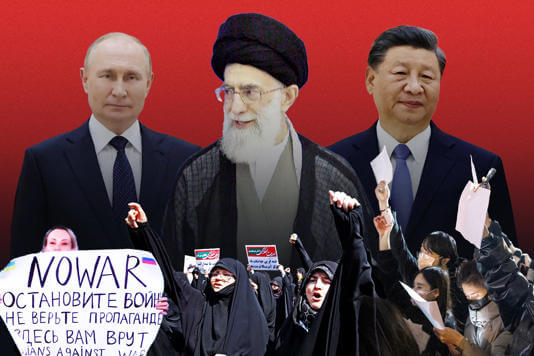1. Revolution in Iran
Since the death of 22-year-old Mahsa Amini at the hands of the Islamic Republic of Iran's morality police, Iranians have stormed Iran’s streets, calling for the downfall of the regime and an end to the strict Islamic law governing the country. In response to the protests, the mullahs have ordered security forces to crack down on the protesters, leading to numerous arrests and the deaths of innocent Iranians. With protests surpassing 100 days, many expect protesters to continue their revolution despite violent suppression from the regime and its hardline supporters. While the U.S. and many European nations have enacted sanctions against the Islamic government, the new year will indicate whether harsher sanctions are applied against the Ayatollahs, the IRGC, and individuals affiliated with the regime. Should the protests continue next year, many expect the regime to draw upon even harsher methods to stop the protests.
2. Russia's Invasion of Ukraine
The late February Russian invasion of Ukraine has lasted over 10 months leading to thousands of deaths and the U.S. and its European allies have responded through sanctioning Moscow and individuals connected to Putin, while supplying Ukraine with military aid to combat Russia. Despite the reports of massive casualties on the Russian side, many expect that Putin will continue his invasion and escalate it even further to the point where weapons of mass destruction could be used. In the new year, many predict that the Ukrainian government will continue to ask for aid from the West and request further sanctions on Moscow and its economy. Experts also predict that if the war continues, the Russian government will continue to rely on anti-American regimes like the Islamic Republic of Iran, China and North Korea for more resources. Some predict a peace agreement might occur between the two governments, given the devastation both sides are incurring.
3. Israel's New Conservative Government
With the election of Likud leader Benjamin (Bibi) Netanyahu and his coalition of various right-wing parties into the Israeli Knesset, many expect new changes in Israel that will dramatically change the country's political and economic landscape. With Netanyahu already deciding on his cabinet, many expect the new government to take a harsher stance against Islamic terrorism against Israel and the Islamic Republic of Iran. While many progressive groups and individuals in the U.S. have condemned the election of Netanyahu and his coalition, experts expect the new Israeli government to push back harder against the Biden administration and its progressive allies on issues like settlements and the Iran nuclear agreement. Should protests in Iran continue in the new year, many expect the new Israeli government to help the protesters in some form and potentially strike Tehran's nuclear facilities. With Israel's economy taking off with more partners in the region, many expect that the new Netanyahu government will continue to create free-market reforms to strengthen Israel's economy and its relations with its Arab allies. As the Islamic Republic of Iran spreads its aggression throughout the Middle East, the new Israeli government could potentially secure a normalization agreement with the Kingdom of Saudi Arabia, marking a historical change in Middle East politics.
4. Islamic Rule of Afghanistan
Since the Biden administration announced its withdrawal of all American personnel from Afghanistan in 2021, the people of Afghanistan have faced brutal repression at the hands of the Taliban government. In 2022, the Taliban enacted anti-women policies, including banning girls from attending school and requiring women to have male counterparts when traveling inside and outside the country. Many expect that in the new year, the Taliban will further their anti-Western laws in the country, cracking down on women and men who refuse to abide by the new Islamic government. With Afghanistan facing economic downfall in 2021, the Taliban could seek new relations in the new year with countries like Russia, China, and Iran to help its economy and strengthen the government against international pressure. While women in Afghanistan have protested against the government, many hope the new year will involve a women's rights revolution in Kabul, like the one in Iran. Given Afghanistan's border with the Islamic Republic of Iran and the anti-American sentiments in both governments, the Taliban and the ayatollahs in Iran could strengthen their relations through military and economic measures against the U.S. and the West.
5. Decline in U.S.-Saudi Relations
With the Biden administration giving Saudi Arabia the cold shoulder since it announced a reduction in oil supply in the fall, relations between Washington and Riyadh have declined to a significant point in American-Middle Eastern policy. With the Saudi Arabian government courting regimes like China for new economic and military relations, many predict this will significantly cripple American influence in the Middle East going into the new year and beyond. With America's energy reserves almost depleted and the administration's harsh stance towards new oil drilling, the decline in Saudi relations could strengthen the predictions of an incoming recession in 2023 by economists. With China on the rise economically and militarily, the recent visit by President Xi Jinping to Riyadh will spell trouble for America's interest in the Middle East and its attempts to decrease China's influence in the world. The move by Saudi Arabia to court China could also hamper the efforts by the U.S. to get Israel to ally with Saudi Arabia, given that the Kingdom might rely on Beijing for military and financial protection.









